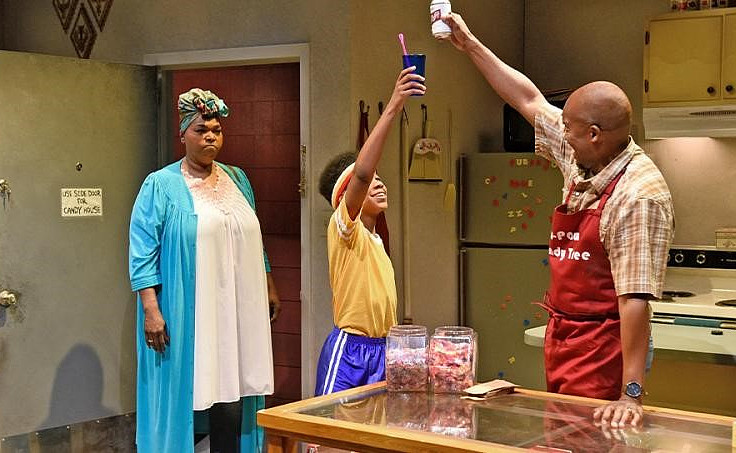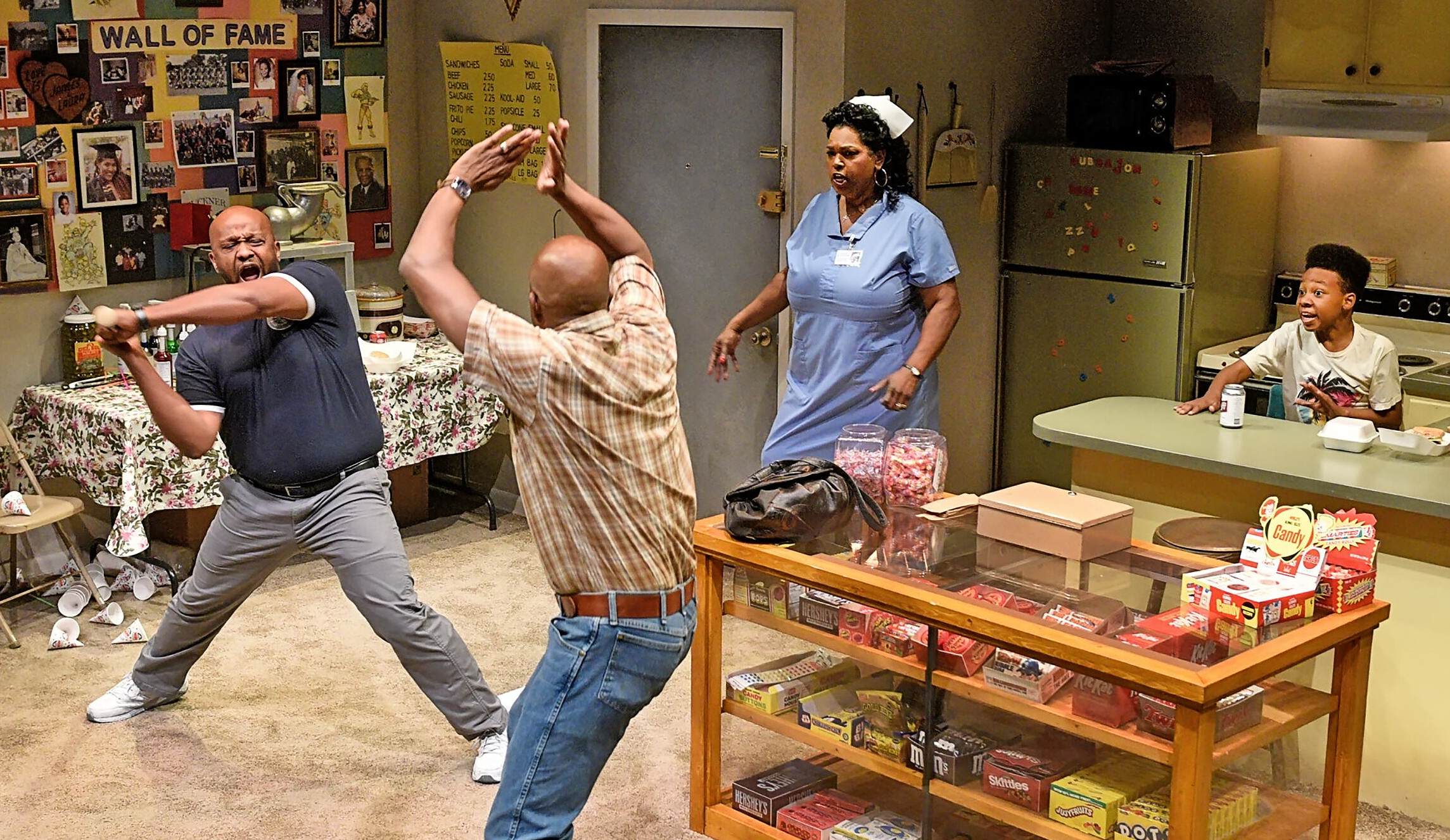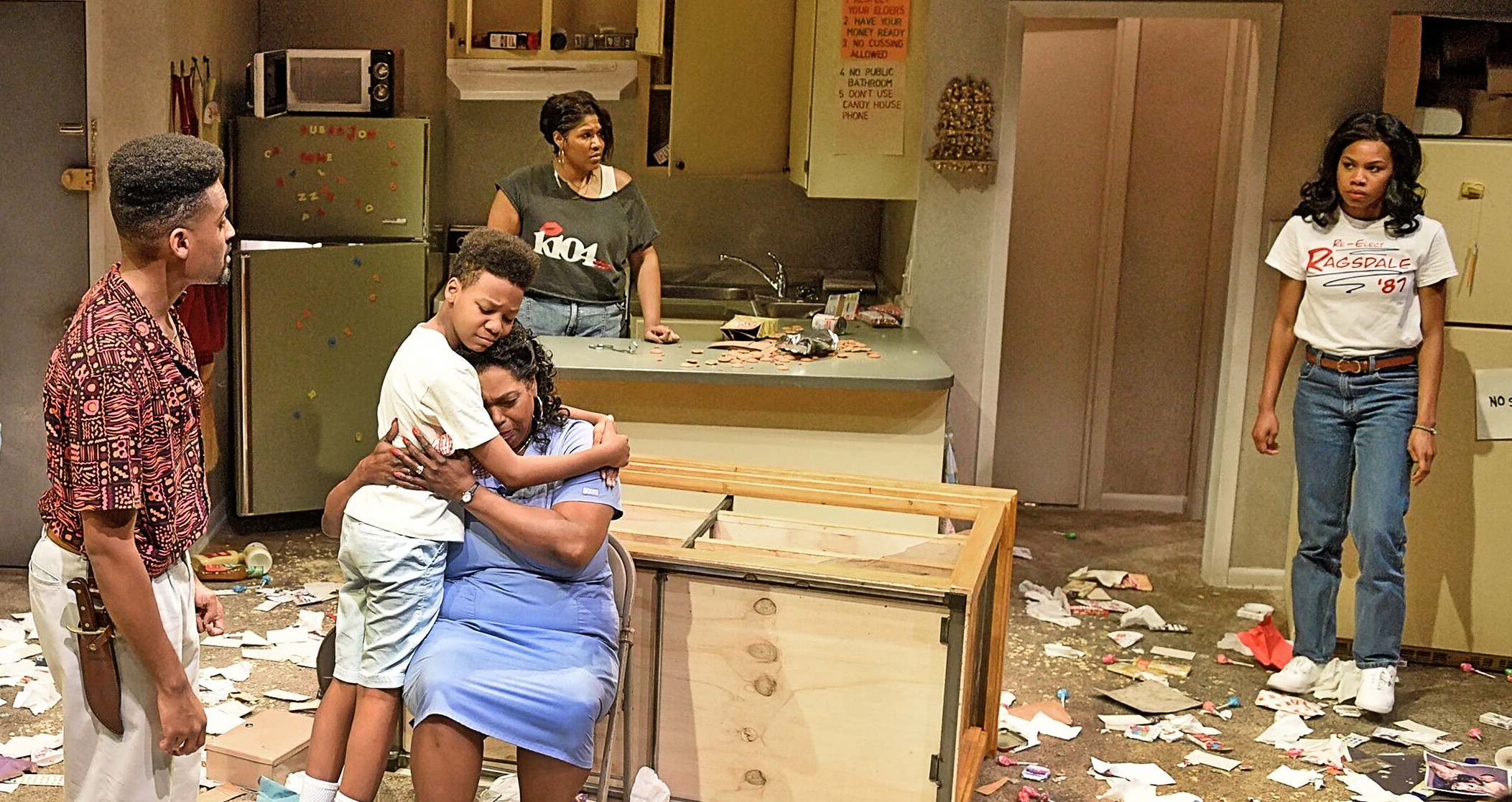Review: ‘Penny Candy’ At The Dallas Theater Center
ArtandSeek.net July 3, 2019 32Late in the first act of ‘penny candy’ – playwright Jonathan Norton’s new play at the Dallas Theater Center – I realized that not only were the characters and their story completely engaging, I sensed that, even with the chaos onstage, the playwright knew exactly what he was doing. It’s that pleasure you feel sometimes, that comfort you get sitting in a theater knowing a real dramatist is at work: This is good – and I want to see where he goes with it.
And I want to see how he gets there. ‘penny candy’ is partly autobiographical. Norton basically tracks three intertwined stories: a boy’s farewell to childhood, a retired father’s efforts at economic independence and a black family’s struggle to balance personal safety with community responsibility in the face of violent social upheaval. The childhood happens inside a candy shop and those social upheavals are brought on by crack cocaine: In effect, the crack replaces the candy – by force. Norton’s title can be read as nostalgic, as an ironic equation between candy and crack or as an expression of regret and loss. The lower-case title ‘penny candy’ – it’s like calling it ‘small change.’
What’s so impressive about Norton’s drama is how expertly he handles all this: Each character is given dramatic respect and weight. Each plot complication – even the furious neighbor (Jamal Sterling) suddenly bashing on the door with a baseball bat, a neighbor we’ve never seen before – even his story turns out to be connected and revealing.
Simply put, ‘penny candy’ is Norton’s most complex, most effective, most accomplished drama. It has one puzzling disappointment that muffles its ultimate impact and it’s not always been given the sharpest direction. But thanks in part to the efforts of such people as Vicki Meek and Donna Wilhelm, who’ve supported and encouraged Norton over the years, we’ve been extremely fortunate in Dallas to watch Norton develop – ever since ‘Homeschooled’ in 2013.
So his skills here shouldn’t come as a surprise, although artistic development is hardly a predictable upward glide. In different ways, all of Norton’s plays have intertwined black history, political history and personal history. He doesn’t write about a central, heroic character – nor that character’s great cause, not directly at any rate. He writes about the tsunami that overcomes the surrounding, ordinary, frightened people. ‘penny candy’ is about the ripple effect of crack. His 2015 drama, ‘Mississippi Goddamn’ wasn’t about the civil rights activist Medgar Evers. It was about the deep troubles and doubts his actions stirred up for Edgars’ black neighbors.
So Norton’s plays have been ‘period dramas’ the way August Wilson’s are (‘Fences,’ ‘Piano Lesson,’ ‘Ma Rainey’s Black Bottom,’ ‘Jitney’). His writing may lack the operatic arias of black language and self-definition that Wilson occasionally overindulged in. And he’s not following the Wilson model so much the plays center on that characteristic Wilsonian male, the rebellious one who angrily defies his community’s or his family’s long-established accommodations, who defies the white man’s restrictions, even the white man’s God.

A toast to irritating Mom: Liz Mikel, Esau Price and Leon Addison Brown in ‘penny candy.’ All photos: Karen Almond
But Norton’s plays do share the same drive to understand and explicate, not our accepted white history (although it inevitably overflows into his dramas), but the struggle to define the African-American self – in that particular time, in that particular place, from inside that community. That’s because, for Norton and Wilson, there’s always a reckoning when black Americans face the provisional nature of their status in our country. This is America: If our racial history has taught us anything over the years, it’s that African-Americans have repeatedly found they have to re-negotiate their lives here, willingly or unwillingly, forcibly or peacefully. That’s why Wilson wrote a drama for every decade of the last century. The struggle may not have changed, but the battlegrounds did.
One talent that Norton has that Wilson often lacked is a welcome and deft hand with humor. To give one small but revealing example of how ‘penny candy’ wraps all this comedy-drama together: Norton sets it in the late 1980s in Pleasant Grove. A ten-year-old boy, Jon-Jon (Esau Price) – the author’s stand-in – enjoys helping his father with his little candy store, a local hangout in an apartment complex. His father, Dubba-J has made a comfortable enough devil’s bargain with Kingston, a Jamaican dealer (Ace Anderson) who lives in the complex. Kingston likes the complex as a friendly neighborhood – all the better for a good hideout. For his part, Dubba-J figures Kingston is a ‘man of business’ who keeps the peace. And his young dope slingers certainly enjoy the snow cones and moon pies on sale.
But then a vicious, outside gang crashes this party with what we know will be the future: They’re selling crack and splattering bullets. So – fat story skinny – a dime bag is tucked away in the candy store. Dubba-J and Laura Mae, his wife, pour out the contents to inspect this ominous substance. “Looks like lil’ pebbles.” “That’s why they call it rock.” “Wonder how they use it?”
Jon-Jon promptly steps up to explain the necessary equipment and ritual, the glass pipe and the cigarette lighter. The comic moment is effortless and perfectly childlike; he’s showing off his knowledge of what’s basically a chemical time bomb. Then comes the kicker: Both parents are aghast. Where did he learn all this dreadful stuff?
“I saw it on ‘Nightline,’” Jon-Jon exclaims. “With Ted Koppel.”

Let me show you my home-run swing: Jamal Sterling, Leon Addison Brown, Liz Mikel and Esau Price in ‘penny candy.’
The comic relief is a welcome ‘button’ for the entire expository exchange – one of the reasons you feel such confidence in Norton’s skills by this point. In fact, that bit simultaneously pinpoints the precise time period of ‘penny candy’ and what the play is about: We’re seeing the moment when crack hit this unaware black neighborhood. And we’re seeing it from inside that community instead of through the drive-by images of crack addicts and gangbangers that movies and TV news often used. They helped make crack practically synonymous in the white mind with “black,” “urban failure,” “gangs” and “moral weakness.” Our current opioid epidemic is a huge social crisis implicating drug companies and the medical establishment throughout white Middle America. Crack, on the other hand, was depicted as a crime wave that black neighborhoods brought on themselves, a torment they somehow deserved.
Along with his inside-the-living-room perspective, Norton offers us something equally rare in American theater: a black childhood, one that doesn’t cozily involve Urkel or the Huxtables but isn’t a hell hole, either. As he has said in interviews, yes, Norton remembers drugs growing up in Pleasant Grove, but they were often ‘over there’ somewhere. His memories of his childhood are mostly pleasant-to-average. He wants to convey that, even with Jon-Jon’s parents’ quarrels and frights, it’s perfectly normal for Jon-Jon to develop his own happy, special, snow-cone recipe or slyly haggle with his father for more spending money.
Norton doesn’t sugarcoat that childhood. Bright and inquisitive, Jon-Jon may know more about how to light up a pipe than Dubba-J and Laura Mae, but he has no idea what’s at stake. He mirrors the blindness in Dubba-J, who’s willing to go along with Kingston so he can live his dream of a side hustle, a path to self-sufficiency without working for the white man.
Dubba-J goes along, that is, until Kingston calmly reveals how brutal he can get.
Directed by Derrick Sanders, ‘penny candy’ has an outstandingly vivid and convincing cast – especially Ace Anderson, who once again commands the Theater Center stage with impressive ease. His Jamaican drug dealer is joshing, family-minded, somewhat mysterious, even seductive – and utterly cold-blooded. Anderson’s island patois is also so impressively thick, Dubba-J demands he speak English, and the audience welcomes the request. Claudia Logan is dead-on natural as Rose, a family friend who’s grown up to be one of Kingston’s foot soldiers. Rose is an unusual character. She should be awful: equal parts drug mule, dope slinger and heartless enforcer. Yet Norton and Logan make this dropout and casual criminal almost sympathetic. Given her situation (she knew early on, school wasn’t for her), she’s made life choices that have their own practical sense. Besides, she’s comfortable, protective and honest with Jon-Jon, which is more than can be said for others.
For all its drama over drugs and violence, ‘penny candy’ feels most rooted in those quiet, conversational scenes between two or three characters: when, for instance, Rose and Nicole try to settle their differences. Nicole (played by the sternly righteous Tiana Kaye Blair) is another family friend, but she became a nurse instead of a dealer.
On the other hand, when there are more than two or three characters onstage and they’re howling for attention, Sanders’ direction loses focus. You’re not sure whom to track amid the noise.

This’ll need more than just a little tidying up. Ace Anderson, Esau Price, Liz Mikel, Claudia Logan and Tiana Kaye Blair in ‘penny candy.’
A strong sign of this: Playing Laura Mae, the mother, Liz Mikel has basically been set on Loud and Unhappy – and left there. Mikel can bring much more to a character, but here, she’s the Big Angry Mama. ‘penny candy’ is a welcome opportunity to watch Sterling, Blair, Logan and others dig into real people, but Mikel’s Laura Mae is like something from a black sitcom. Another sign of a weakness, this time in the script: The drama over crack and Kingston ultimately sidelines Jon-Jon. Norton is doing an elaborate and careful weaving job here with his storylines, evoking the entire ‘black village’ in these apartments. But while Jon-Jon is sometimes a cause for action in several scenes in the second act, his importance increasingly recedes. The focus shifts instead to Dubba-J – played as perplexed and ineffectual by Leon Addison Brown, a weary man always looking for a peaceful way to cruise through. For Norton, it’s as if, once Jon-Jon is so frightened and overwhelmed, he wails – then the boy has nothing more to say.
So now to address the single serious failing with ‘penny candy’ as a production and a play. We must step over to the instrument panel and pull the large lever that sets off the Great Flashing Red Spoiler Alert. Because, yes, this involves the ending. And if you don’t want to know the play’s final moments before you go see the play (and you should go see the play), read no further.
We good?
OK. So. It’s generally not a happy sign when the audience is uncertain whether a play is truly over. Our revels now have ended, Yes, yes, they really have. But that kind of uncertainty happened opening night with ‘penny candy.’ People held their breath, held their applause, flickers of clapping died out, then came back.
‘penny candy’ does not turn into a full-on, bloody tragedy, although there’s a climactic physical struggle towards the end. There’s been enough violence along the way that a big payoff can feel dramatically logical, and some theatergoers may find the lack of one a tad disappointing. But Norton isn’t aiming for the heroic grandeur that tragedy requires. Instead, there’s more of a fadeout, which is closer to Norton’s point about black people stumbling, stepping up – or stepping away. Immediately after that struggle, characters start exiting – for different reasons, at different speeds. But it’s clear Norton’s three storylines have wrapped up: the end to childhood, the loss of financial independence from the white man and whether a forced departure from Pleasant Grove might be necessary.
So only Jon-Jon, Dubba-J and Laura Mae are left in the wrecked apartment. Norton’s playscript says that “the family starts to leave. Jon-Jon stops at the front door. He takes one final look at the candy house. His father gently tugs him to leave” – and then they’re all gone. After a few moments, the lights darken, we hear a police chopper and see its lights jitter past the window.
One reason the audience wonders if maybe this isn’t the ending is that, on opening night at least, neither father nor son stopped to look back. In fact, everyone pretty much skedaddles. None of the characters bothers to consider what they’re leaving behind, how their lives have just changed. Director Sanders didn’t have the actors allow the moment to achieve the full resonance it needs.
What added to the audience’s confusion, though, is that typically, when actors leave and the stage lights go dark, we assume a scene is done. But here, just when that seems to be the case – and applause started up – Norton has the chopper return and the lights flicker. We’ve just witnessed everyone flee or stomp out. But perhaps someone’s coming back. The police? Perhaps one of the characters forgot something. Maybe Norton is actually going to leave this candy store’s door open just a bit.
Yes? No? Clap or wait? Admittedly, that lack of a needed pause may have happened only at the performance I witnessed and was rectified in subsequent shows. But together, the actors’ abrupt departure and the chopper’s arrival muddle the play’s somber wrap-up: This penny candy life is over – while the militarization of the black community steps up. Norton wants the criss-crossing of the domestic and the political for his ending to work.
I’ve gone at length here because most of what comes before is so sharp, it only heightens the minor disappointment of the ending. The accusations and wisecracks of Norton’s characters are so precisely targeted, their back stories revealed with such casual credibility that the ending feels much like when candy . . . suddenly melts away too soon.
But the best flavors linger. You want more.










